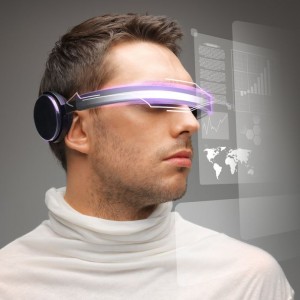 Virtual reality is undoubtedly the next big thing. Ever since Oculus introduced the world to its Rift all the way back in 2011, the world has been crazy about virtual reality technology. “The future is here!” websites exclaimed enthusiastically. “We’re one step closer to transporting ourselves into virtual worlds”, reviewers claimed. Over the years since then, numerous companies have attempted to copy the Rift and create their own wearable VR technology, such as the HTC Vive, the PlayStation VR and the delightfully terrible Google Cardboard. Left and right we’re seeing products pop up aimed at one, or more than one, of the VR products. Numerous services, such as Netflix, have also shown us that they’re more than willing to accommodate what is universally perceived as being the Next Big Thing™. But is it, really?
Virtual reality is undoubtedly the next big thing. Ever since Oculus introduced the world to its Rift all the way back in 2011, the world has been crazy about virtual reality technology. “The future is here!” websites exclaimed enthusiastically. “We’re one step closer to transporting ourselves into virtual worlds”, reviewers claimed. Over the years since then, numerous companies have attempted to copy the Rift and create their own wearable VR technology, such as the HTC Vive, the PlayStation VR and the delightfully terrible Google Cardboard. Left and right we’re seeing products pop up aimed at one, or more than one, of the VR products. Numerous services, such as Netflix, have also shown us that they’re more than willing to accommodate what is universally perceived as being the Next Big Thing™. But is it, really?
As numerous devices along the years have shown us, you can’t really force the Next Big Thing™ into existence. Those Things, much like heroes, are not born – they’re made. I mean, remember the N-Gage? The Kinect? The Gizmondo? Yeah, I didn’t think so. All of those ideas were, at one point, meant to capture the imaginations of people everywhere, except they did not, and are now not even a footnote in the history of technology. Why? Because the market simply wasn’t viable for them, just like it may not be viable for VR. Keep in mind that Virtual Reality is going to be incredibly expensive, to the point where an Oculus Rift is going to cost north of $600, and even the cheaper devices are expected to exceed $350. Even with the incredible demand for those headsets, chances are that rather than a common household item like a laptop or a videogame console, VR devices may simply turn into novelty items that people buy as status symbols.
Keep in mind that VR isn’t magical by itself – it requires software in order to run right, mostly videogames. Videogames are incredibly expensive to make, and if they want to sustain themselves companies need to go for the lowest common denominator, the mass market that’s guaranteed to turn in a profit. Extra Credits did a wonderful video on the subject where they explain that, when faced with the choice whether to develop a big-budget game for a console that dozens of millions own versus a game for a device that only hundreds of thousands own, the decision that is right for the market is rather obvious. Worst case scenario, it becomes a closed circle – not a lot of people own a VR headset, which means that not a lot of developers will want to create software for it, which means that not a lot of people will be interested in buying one, and so on and so forth. While I’d certainly be very happy if this, honestly, quite promising technology succeeds, I’m also somewhat worried about its success.

 Whenever I speak with someone about online casino, I often hear something along the lines of “These online casinos are just a gigantic sham! They’re lying to you, trying to hook you in, and only give you tiny wins to keep you playing! I mean, have you ever heard of someone winning more than a few hundred on one of those things? It’s a conspiracy, I tell you!” Well, even ignoring the fact that it’s very well-known that all online casinos are VERY highly monitored and regulated from numerous agencies (some run by the government, some private – depending on where you live), news reports of people who win outrageously giant sums keep popping up all the time. Even if the vast majority of casino winners make their money little by little and accumulate profits over time, those success stories aren’t particularly news-worthy, so instead we get bombarded by a ton of articles about people who won life-changing sums in a single bet.
Whenever I speak with someone about online casino, I often hear something along the lines of “These online casinos are just a gigantic sham! They’re lying to you, trying to hook you in, and only give you tiny wins to keep you playing! I mean, have you ever heard of someone winning more than a few hundred on one of those things? It’s a conspiracy, I tell you!” Well, even ignoring the fact that it’s very well-known that all online casinos are VERY highly monitored and regulated from numerous agencies (some run by the government, some private – depending on where you live), news reports of people who win outrageously giant sums keep popping up all the time. Even if the vast majority of casino winners make their money little by little and accumulate profits over time, those success stories aren’t particularly news-worthy, so instead we get bombarded by a ton of articles about people who won life-changing sums in a single bet. According to statistics, the online gambling industry is HUGE. I mean, really, really big. In 2015, the global online gambling industry (which includes online casino, betting, lotto, bingo and all other gambling activities that happen on the Internet)
According to statistics, the online gambling industry is HUGE. I mean, really, really big. In 2015, the global online gambling industry (which includes online casino, betting, lotto, bingo and all other gambling activities that happen on the Internet)  Ah, technology! In the 21st century, we literally can not live without it! Technology is handling our communications, driving our economy and in a lot of cases literally keeping us alive through the use of life support systems and advanced medicine. We, as a species, have collectively evolved to rely on technology for literally everything… And that’s a good thing! Just like how millions of years ago we evolved to walk on two legs, or like the taste of cooked meat, or hunt using tools, today we have evolved to use the Internet for our daily needs and convenience, allowing us more time to focus on family and hobbies. While before reaching the masses required you to sit in the middle of a square and shout, today doing it is literally as easy as just tapping your fingers on a piece of plastic in a certain pattern. I’m doing it right now!
Ah, technology! In the 21st century, we literally can not live without it! Technology is handling our communications, driving our economy and in a lot of cases literally keeping us alive through the use of life support systems and advanced medicine. We, as a species, have collectively evolved to rely on technology for literally everything… And that’s a good thing! Just like how millions of years ago we evolved to walk on two legs, or like the taste of cooked meat, or hunt using tools, today we have evolved to use the Internet for our daily needs and convenience, allowing us more time to focus on family and hobbies. While before reaching the masses required you to sit in the middle of a square and shout, today doing it is literally as easy as just tapping your fingers on a piece of plastic in a certain pattern. I’m doing it right now!